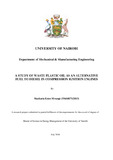| dc.description.abstract | Liquid hydrocarbons or fossil fuels are widely adopted as sources of energy for prime movers, including internal combustion engines, because they are easy to handle and have a high energy density. Diesel engines are efficient prime movers, and usually find application in a wide array of areas, including industrial, agricultural and transport sectors. Consequently, conventional hydrocarbon fuels such as petroleum and diesel have remained unchallenged as the preferred sources of energy for engine prime movers. However, the demand for diesel and other petroleum-based fuels across the globe, especially in developing nations such as Kenya, has been rising steadily leading to concerns for long-term energy security. Kenya continues to import vast amounts of petroleum from the Gulf region leading to high energy costs. In addition, the increased use of hydrocarbon fuels use leads to air pollution, both at local and regional levels, ultimately leading to climate change. Due to a combination of these factors, various research initiatives aimed at developing suitable alternative sources of energy continue to be undertaken. This work is one of such initiatives.
This study investigated the suitability of the use of waste plastic oil as an alternative fuel for compression ignition engines. The fuel properties and characteristics of waste plastic oil and its blends with diesel were determined and compared to those of diesel. Comparative engine performance and emission tests were carried out on a 4-stroke, 1-cyliner Kirloskar diesel engine rated 3.5 kW at 3500 rpm. This study investigated the effect of blending waste plastic oil with diesel on fuel properties, engine performance, engine emissions and economic costs.
The fuel properties and characteristics of waste plastic oil were found to be similar to those of diesel while blending diesel with waste plastic oil was found to improve its fuel properties and characteristics to within the minimum and maximum accepted standards, except for density and flash point. The brake thermal efficiency of waste plastic oil was found to be 14% higher than that of diesel. The study revealed the energy consumption cost per power output for waste plastic oil to be 40% lower than that of diesel. | en_US |

